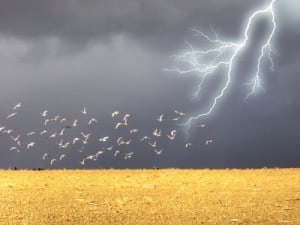Writing Tip 70: Lightening vs. Lightning
 Politics can be fascinating, can’t they? Every once in a while I play with writing opinion pieces (like this), some of which walk on the edge of political debate. Recently, I came across a book on the subject entitled Political Writing: A Guide to the Essentials. In it, the author writes:
Politics can be fascinating, can’t they? Every once in a while I play with writing opinion pieces (like this), some of which walk on the edge of political debate. Recently, I came across a book on the subject entitled Political Writing: A Guide to the Essentials. In it, the author writes:
“So it stands to reason that one of the tasks you must successfully complete in your quest to become a good writer is to expand your vocabulary. The more words you have mastered, the more distinctions you can make.”
I’m totally cheering on the author at this point. He clearly gets it. He’s helping people change the world. He’s surely a master with words himself. Then, I come upon this sentence:
“Mark Twain, who once observed that there are no true synonyms in the English language, said it best: ‘The difference between the right word and the wrong word is the difference between lightening and the lightening bug.’”
And once again, I shake my head at the state of politics today. Even their advisers seem lacking. Did you catch why?
“Lightening” and “lightning” are two different words. That giant bolt of static electricity once thought to be summoned by the gods is “lightning.” The verb “to lighten” is written as “lightening” in its present participle state. Auto-correct or spellcheck won’t help you with this one. You just have to pay attention.
Clever old Samuel Clements had his way with words, so let’s at least try to do the man justice by getting them right.